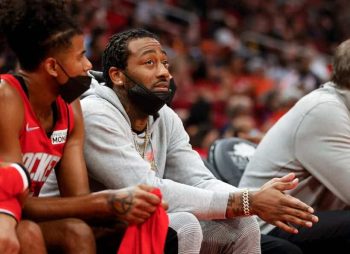NBA
NBA AM: Mavericks Still Facing Ghosts From The Past

The Dallas Mavericks (32-45), eliminated from playoff competition this season, will be watching the festivities from an unfamiliar vantage point.
Home.
Since the 2000-01 campaign, a span of 17 seasons, the Mavericks have missed the playoffs only twice while becoming a beacon of consistency. However, the team is at a pivotal point heading into the offseason as the franchise tries to reenter the land of the league’s elite.
Despite a visible and heavily involved owner in Mark Cuban, the Mavericks have surprisingly failed time and time again to lure top free agents into the fold despite their track record of on-court success over the past 17 seasons.
The exact cause on why players have rebuffed the Mavericks advances in recent years remains unclear, but the team, in many respects, is still reeling from the decision to break up a championship roster during the summer of 2011.
In 2011, fresh off the heels of an NBA title, the Mavericks had a big decision to make: invest in their aging veterans or start a reloading project. The team decided to reload on the fly – sacrificing a chance to repeat immediately to position themselves for an opportunity remain among the elite for a longer duration.
Even in hindsight, the decision was solid on the surface. The Mavericks had future Hall of Fame forward Dirk Nowitzki, coming off one of the greatest NBA playoff runs ever, still playing at an extremely high level. The team was also over the luxury tax line and lacked flexibility under a more prohibitive Collective Bargaining Agreement during that time.
Veterans Tyson Chandler, DeShawn Stevenson and J.J. Barea were casualties of the reloading project. At the core, the team was hesitant to give a big dollar contract to Chandler, who was approaching 30 years old and relied heavily on athleticism. Chandler was the team’s defensive anchor during his lone season in Dallas and losing him was a blow. In hindsight, Chandler has had injury problems as he’s gotten older, but has played in at least 60 games in four out the past six campaigns.
The team notably added Lamar Odom, Vince Carter and Brandan Wright during the summer of 2011. Carter was respectable, but Odom struggled mightily from the beginning and Wright missed nearly 20 games in the lockout-shortened campaign.
During the summer of 2012, only Nowitzki and forward Shawn Marion would remain from their championship campaign in 2011. During that summer veterans Jason Terry and Jason Kidd departed and the team set their sights on point guard Deron Williams, an All-Star caliber player at the time. The hope was that a Nowitzki and Williams combo would help lead to more free agents giving the Mavericks a strong look. However, Williams re-signed with Brooklyn and the team added veterans Eddy Curry, Elton Brand, Darren Collison and Chris Kaman. For the record, the 2012-13 campaign marked the only other time Dallas missed the playoffs during this 17 season stretch.
Summer of 2013 saw the team go hard and heavy after center Dwight Howard after an up-and-down year in Los Angeles. Howard went to Texas but donned a Houston Rockets uniform. The team made the playoffs the following season as an eighth seed after settling for Monta Ellis, Samuel Dalembert and Devin Harris in free agency after the Howard whiff.
The 2014 offseason free agency class was headlined by LeBron James and Carmelo Anthony. The Mavericks weren’t on those two stars’ short list, but did reacquire Chandler from the New York Knicks and lured promising forward Chandler Parsons from the Houston Rockets. Barea also came back to Dallas. But the next summer, in 2015, is where the Mavericks’ inability to close the deal in free agency shines brightest. The team had a verbal commitment from center DeAndre Jordan to sign with the team when the league’s annual moratorium was lifted, but Jordan had a change of heart and re-signed with the Los Angeles Clippers, leaving Dallas scrambling to find interior depth. Making the Jordan move even more painful was the fact the team decided to let Chandler walk out the door, again, after putting all of their stock into Jordan.
Last summer, the Mavericks were in the market for center Hassan Whiteside and point guard Mike Conley. Both decided to re-sign with their respective teams. Dallas also couldn’t secure a meeting with the league’s top free agent, Kevin Durant. That was shocking to many, as most believed the Mavericks at least had the pedigree to earn a seat at the table. The team ultimately landed forward Harrison Barnes as their headliner and he has put together a career season in 2017 with plenty of growth seemingly ahead.
Unlike most teams that have entered into crippling contracts that reduced their ability to target top tier free agents each summer, the Mavericks managed the salary cap brilliantly and were able to be free agent players over the past few seasons.
The problem is, as Nowitzki’s Hall of Fame career winds down, the Mavericks haven’t truly been able to fully recover from the decision to reload immediately after the club’s 2011 championship. Yes, the club has reached the playoffs in four of the past six seasons, but all four appearances ended in first round eliminations.
Heading into this summer, once again, the Mavericks are poised to be in the mix with upwards of $30 million in cap space available for free agency spending/roster building. But the true question here is can Cuban and company finally land their marquee free agent to usher in life after Nowitzki? Or will the ghosts of 2011 continue to haunt a franchise with everything seemingly in place—fan base, owner, head coach, hardworking veterans and cap space.
Six years ago, the Mavs were on top of the mountain. Six years later, they’re still trying to make it back.













